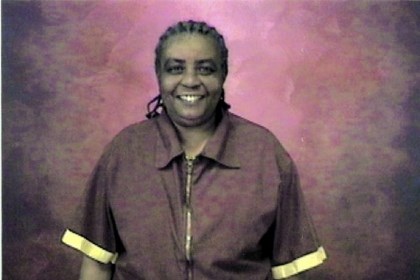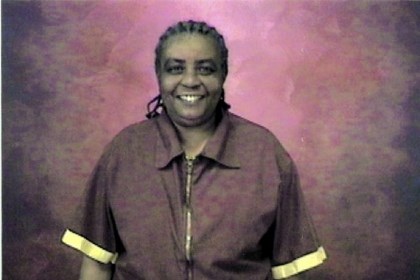
Sharon Wiggins
I set up twelve wooden fold-up chairs around four long, wooden, primitively made tables that I arranged in an open square. One chair was for me. In the middle of the education building at the Solebury Meetinghouse, in a quasi-rural -suburban place an hour outside of Philadelphia I was prepping the room for a free public meeting or rather a conversation that I had been wanting to have for over a year; ever since Peachie died.
The squared stage I set up surrounded by an even dozen chairs appeared warm and balanced-conducive for a conversation about the struggles that women and girls experience while serving life without parole in Pennsylvania. If by chance fewer people showed up for the meeting, the arrangement wouldn’t look empty and feel cold. If by chance more people showed up, there was room to sit behind those seated at the table. I placed my agenda and handouts in a well made basket; a gift from a friend many years a go.
This room, I am comfortable in. In this room, once or twice a month for three and a half years I held Cub Scout den meetings. Two years a go, I welcomed the Fight For Lifers to present their educational initiatives at a meeting I had organized. Scouting and life sentences. There has got to be a connection: the responsibility that we have to be informed citizens? That might be it. By the way I am not a Quaker.
My plan was to share the devotion I have for Naomi, Marie, Sheena, Juvenile Girl, Avis, Joyce, Jessie, Tequilla and others. And to convince the citizens of Bucks County that these are just a handful of the women I have become acquainted over the last three years as an Official Visitor with the Pennsylvania Prison Society and who have earned and deserve to be given the opportunity to be reintegrated into the the free world. But because I have been thinking about this problem of no parole in Pennsylvania for lifers for three years, I have come to realize that the average person in my part of the state, knows nothing about this injustice. Not only for adults, but definitely not about juveniles serving this capital equivalent sentence.
So, because of that I needed to give some historical information about mandatory sentencing, the shut down of commutation and comparisons to other states and countries in order to illustrate with as much punch as possible how Pennsylvania is in a time warp and in terms of penological practices, about as progressive as a closed, oppressed Asian nation. And I realized that before I could concentrate on women’s issues, I was half way through the meeting discussing general prison issues that affect both men, women and their families: the cost of making phone calls, lousy food and medical care, staff turnover, lack of educational opportunities, isolation in remote parts of the state affecting visitation, commutation futility, well trained staff, leadership turnover and that for lifers, doesn’t get any easier or cheaper.
I tried to illustrate all of these struggles with the views and experiences of a woman or grown up juvenile girl serving life. I shared the accomplishments that the women are proud of, the sentence of life that they received that clearly does not reflect their degree of guilt, decades of isolation and the absurdity of being deemed unworthy and too dangerous to live in the free world. Ever. The small and nearly empty visitor’s room at Muncy and Cambridge Springs speaks loudly: where are the male relatives? How can women become better and more effective leaders while incarcerated? How can their voices be heard?
The excessive power that the victim’s rights groups have over our criminal justice system and their success in hijacking any sense of compassion and mercy to our most marginalized members of our society has retarded our spiritual growth. The ignorant and lazy elected officials who do nothing to not only educate themselves about this tragedy, can’t even take the time to meet a women serving life for decades has trumped any chance of Pennsylvania to be an evolving and decent place to empathize with those who have served many decades in prison and who have served their time so well, that many have more to be proud of then those who have never served a single day in prison.
The meeting was attended by nine engaged and thoughtful people. Four of us were already in this struggle and the remaining five came with some knowledge of the absurdity of our overly punitive incarcerated state and have the desire to learn more. The woman from her book club will undoubtedly be more effective in her upcoming group discussion on the book “Doing Life.” I guess this is a step in the right and just direction.
(Photo Credit: Pittsburgh Post-Gazette)

